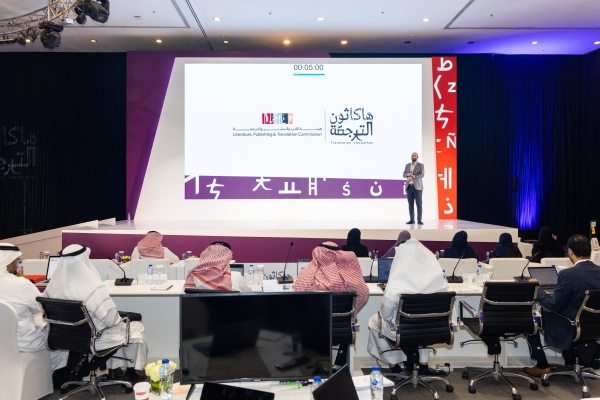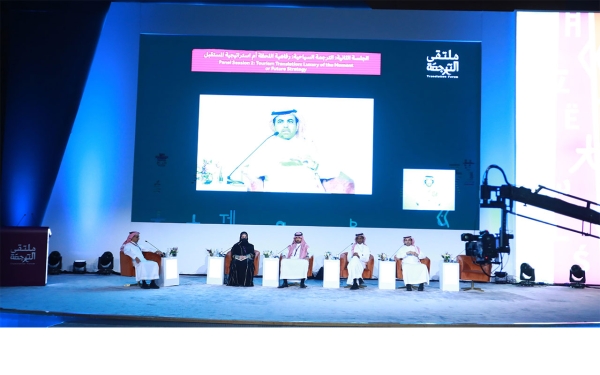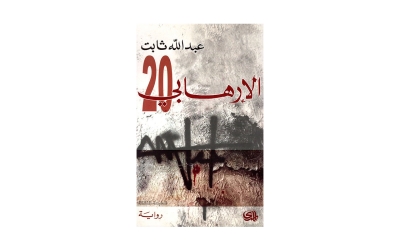


The translation movement in the Kingdom of Saudi Arabia is a literary, scientific, and cultural movement, and a means to facilitate economic development and cultural exchange with countries and peoples around the world. It began with the official establishment of the Shura Council in the Kingdom on August 29, 1926, to know and understand the policies, laws, cultures, and civilizations of other countries and formulate political and diplomatic relations with them through translation.
The academic interest in the translation movement in the Kingdom
Saudi universities have included several colleges of languages and translation, including the College of Languages and Translation at King Saud University, with its five departments: English Language and Translation, Linguistics, French Language and Translation, Modern Languages and Translation, and Linguistic Preparation for Non-Arabic Speakers. Princess Nourah bint Abdulrahman University also has a College of Languages offering programs in English, French, Chinese, Applied Linguistics, English Literature, and Cultural Studies, along with specialized master's degrees in English and French translation. Additionally, there are colleges of languages and translation at Jeddah University and Najran University, as well as the College of Arts and Humanities at King Abdulaziz University, represented by the Department of Modern Languages and Literatures. The college has added Chinese language studies to English and French, and offers bachelor's, master's, and diploma degrees in the three languages.
Prince Sultan University inaugurated a center for translation and authorship, offering grants for authorship and translation, and organizing a translation competition among Saudi universities. It also held a translation exhibition to showcase the works of male and female student translators, with the participation of specialized language and translation centers. Prince Fahad Bin Sultan University included the Department of English Language and Translation in the College of Science and Human Studies, along with a center for translation and linguistic editing.
The English Language and Translation Department at Saudi Electronic University was established at the beginning of the academic year 2014. It offers bachelor's, master's, and diploma degrees in English language and translation sciences through a program that adopts a scientific teaching methodology emphasizing diversity in teaching methods. The program uses technology and modern educational tools in all its courses and academic levels. It aims to prepare students for the practical aspects of translation, both written and oral, localize English language education, and reach a wider audience to enhance their linguistic skills. The department offers programs starting with a Bachelor's degree in English Language and Translation, followed by a Master's degree in Translation Technologies. Additionally, a diploma program in English language was added starting from the academic season 2021.
Saudi Observatory of Translation
The Saudi Observatory of Translation provides information about the translation movement in its various aspects through accredited documentation standards. It establishes a digital database that enables translation entities to understand their reality in production, contributing to the development of strategic plans for their translation activities. This helps establish a unified national plan for the translation movement in the Kingdom, contributing to the transfer and localization of knowledge.
The Saudi Translation Observatory has translated 3,116 books over eighty-four years, covering books published within the Kingdom. It was awarded the Custodian of the Two Holy Mosques Prize in 2007.
Literature, Publishing, and Translation Commission
The Literature, Publishing, and Translation Authority, affiliated with the Ministry of Culture, was established on February 4, 2020. It is responsible for managing and regulating the literary, publishing, and translation sectors, serving as the official reference for these sectors in the Kingdom. The commission aims to contribute to achieving the aspirations of Saudi Vision 2030 and to implement the National Cultural Strategy, which aims to make culture a lifestyle for individuals, empower its role in economic growth, and enhance the Kingdom's international standing.
The commission held the International Translation Forum to discuss translation affairs. In its second edition held in November 2022, it showcased modern techniques and trends in the translation industry, as well as new opportunities enabled by technological advancements for translation development. Additionally, the commission established the "Arab Translation Observatory" in 2022 to coordinate Arab efforts in translation and support its progress. The observatory aims to document the translation movement in the Arab world, serving as a reference and gateway for knowledge and cultural exchange. It comprises four committees: the Higher Scientific Committee, the Studies and Research Committee, the Monitoring and Documentation Committee, and the Business Development Committee.
The commission launched the "Tarjim" initiative as part of its efforts to support the translation movement in the Kingdom and enrich Arabic content with valuable translated materials from various languages. This initiative includes two paths: translation grants and academic journals.
International Translation Day
The Kingdom celebrates International Translation Day on September 30 of each year. The King Abdulaziz Public Library in Riyadh issues dozens of translated and localized books, especially those related to the history of the Arabian Peninsula and the Kingdom.
King Abdullah Bin Abdulaziz International Award for Translation
The King Abdullah Bin Abdulaziz International Award for Translation was established in 2006 upon the approval of the Board of Directors of the King Abdulaziz Public Library in Riyadh. It is an international appreciation award granted every two years for outstanding works and notable efforts in the field of translation to and from Arabic. The award aims to stimulate the translation movement between languages, enhance cultural communication, and support translators worldwide by honoring outstanding works, individuals, and institutions in the field of translation.
The award is granted in six categories: Translation Award in the Humanities from Other Languages into Arabic, Translation Award in the Humanities from Arabic into Other Languages, Translation Award in the Natural Sciences from Other Languages into Arabic, Translation Award in the Natural Sciences from Arabic into Other Languages, Translation Award for Institutional and Organizational Efforts, and Translation Award for Individual Efforts.
The winners of the award receive a certificate of appreciation stating the reasons for receiving the award, along with SAR750,000 (USD200,000) for each award, and SAR500,000 (USD133,000) for the Translation Award for Individual Efforts, in addition to a commemorative medal.
Until 2023, sixty Arab and foreign countries participated in the award's sessions. The number of nominated works until its tenth session exceeded 1,500, translated into forty-one languages, with 123 winners receiving the award.
The Translation Award, affiliated with the Ministry of Culture
The Translation Award is one of the national cultural awards presented by the Ministry of Culture. It is awarded to recognize the efforts of translators, encourage translation, and celebrate outstanding translated works that contribute to enhancing global cultural exchange and expanding knowledge horizons.
The Translation Award aims to achieve both Arab and international recognition through its pathways and sustainability. It seeks to stimulate competitiveness in the translation market, and encourage Arab and international individuals and institutions, as well as anyone interested in this field, to participate. Additionally, the award aims to honor contributors to translation, localization, and knowledge dissemination, elevate the standards of translation, and enrich the Arab library with global cultural works.
Both interpreters and translators are eligible for the Translation Award. Regarding the participation and nomination process, candidates can nominate themselves directly through the electronic platform, or they can be nominated by others. Specialized committees within the Ministry of Culture also nominate candidates.
Translation in the Two Holy Mosques
The General Authority for the Affairs of the Grand Mosque and the Prophet's Mosque provides translation services for worshippers, pilgrims, Umrah performers, and visitors at the Grand Mosque and the Prophet's Mosque through the Translation Project. This project is part of the Custodian of the Two Holy Mosques' Project for Interpretation at the Grand Mosque.
In 2014, the Custodian of the Two Holy Mosques Project for Interpretation for visitors of the Two Holy Mosques was launched. It includes the translation of Friday sermons at the Grand Mosque and the Prophet's Mosque for non-Arabic-speaking worshippers, ensuring that the message of the sermons reaches Muslims in their own languages. Additionally, it involves translating sermons and lessons into the languages of the pilgrims, Umrah performers, and visitors. The General Authority for the Affairs of the Grand Mosque and the Prophet's Mosque provided specialized translators to explain the project and its applications to non-Arabic-speaking visitors of the Grand Mosque and the Prophet's Mosque.
The services of the General Authority include the "Two Holy Mosques" app, which provides both text and audio translations of sermons. This electronic service enables users to read and listen to the sermons and translate their content.
Since 2018, the Agency for Languages and Translation at the General Authority for the Affairs of the Two Holy Mosques has been providing the translation of the Arafat sermon. As part of the Custodian of the Two Holy Mosques' project to translate the Arafat sermon into twenty languages: French, English, Persian, Urdu, Hausa, Russian, Turkish, Punjabi, Chinese, Malay, Swahili, Spanish, Portuguese, Amharic, German, Swedish, Italian, Malayalam, Bosnian, and Filipino. The translations are broadcast via the Manarat al-Haramain platform to reach most parts of the world, in addition to the translation being broadcast on the Quran and Sunnah TV channels and ten FM radio stations.
The General Authority for the Affairs of the Two Holy Mosques also offers translation services in ten languages: English, French, Urdu, Persian, Turkish, Malay, Russian, Chinese, Bengali, and Hausa through the "Remote Languages Initiative of the Grand Mosque Pulpit."
The service includes translating the Friday sermon and broadcasting it via FM radio waves, translating books and pamphlets into the approved languages, translating instructional signs and electronic screens, gifting translated Qurans, translating scientific and religious lessons and broadcasting them through the Manarat al-Haramain electronic platform, responding to inquiries, providing location guidance in various languages in prayer areas and counters, providing pilgrims and visitors to the Grand Mosque with QR code links to interactive maps, and links to the "In Your Language" initiative for listening to sermon translations year-round via accompanying headsets.
Translation of the meanings of the Holy Quran
The King Fahd Complex for the Printing of the Holy Quran in al-Madinah al-Munawwarah, affiliated with the Ministry of Islamic Affairs, Dawah, and Guidance, publishes translations of the meanings of the Quran into various languages to facilitate the understanding of the Book of Allah for non-Arabic speakers.
Until May 2024, the King Fahd Complex for the Printing of the Holy Quran has issued translations in seventy-seven languages, including thirty-nine Asian languages, twelve European languages, and eighteen African languages.
Related quizzes
Related articles

